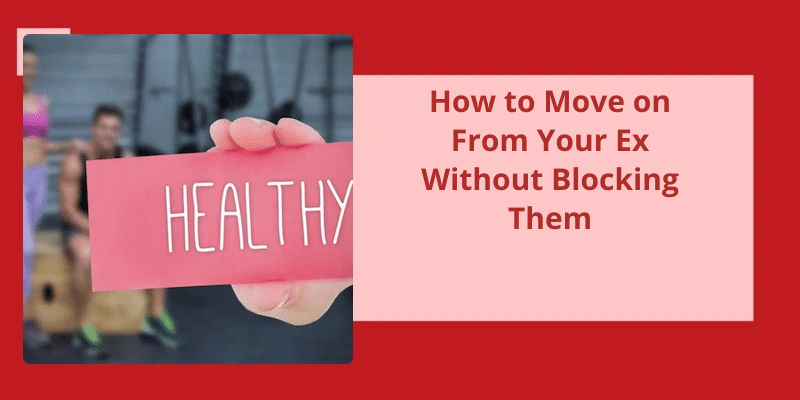Breaking up with a significant other is one of the most difficult things one can experience. It involves a lot of emotions that may leave one feeling overwhelmed, hurt, and unappreciated. Moving on after such an event can be a challenging process. There are many ways to do so, including indulging in social activities, focusing on self-improvement, and burying oneself in work or hobbies. However, some people may find themselves struggling with the decision to block their ex-partner from their lives. This decision, while tempting, isn’t always the best option. In these cases, finding a way to get over your ex without blocking them may be the most appropriate way to move on. While this can be an emotionally charged and confusing time, it’s possible to find a way forward.
Should I Block Him if I Want to Move On?
However, there are a few things that you need to consider before making that decision. Firstly, blocking someone doesn’t always mean that you’ll completely forget them. If you truly want to move on, you need to work on yourself and not just rely on the act of blocking someone. You need to reflect on what went wrong and learn from your experiences. This process will help you grow as a person and eventually move on.
Secondly, before you block someone, you need to determine whether that’s the right decision for you. Are there any unresolved feelings or issues that you need to address before making this decision? It’s important to be honest with yourself and understand your emotional state. You don’t want to make a rash decision that you may regret later.
Thirdly, consider the circumstances surrounding the breakup or the reason why you want to move on. Are you trying to get over a toxic relationship? If so, then blocking the person may be necessary for your own well-being and mental health. On the other hand, if the breakup was amicable and there’s no animosity between the two of you, blocking them may not be necessary.
However, it’s important to take the time to reflect on your decision before making it. Work on yourself, examine your feelings, and consider the circumstances surrounding the breakup.
How to Work on Yourself After a Breakup
After a breakup, it’s important to work on yourself by taking time to heal, reflect on the relationship and what you want for your future, and practicing self-care. Doing activities that you enjoy, journaling, talking to friends and family, and seeking therapy or counseling can also be helpful in the healing process. It’s important to avoid jumping into a new relationship too soon and instead focus on building a healthy relationship with yourself first.
When it comes to dealing with a breakup, there are several strategies people often employ. One of the most common is to block or unfollow their ex on social media, but is this really the best approach? Many people wonder whether they should block their ex if they can’t seem to get over them. While there are pros and cons to both blocking and not blocking your ex, there are a few key factors to consider when deciding what to do.
Should I Block My Ex if I Can’t Get Over Him?
Blocking your ex can seem harsh, but it can also be a positive way to protect yourself from further emotional pain. When we’re trying to move on from someone, seeing pictures or posts from them on social media can be extremely difficult, and can result in reliving painful memories or feelings. By blocking your ex, you remove the temptation to check their profiles or see what they’re up to, and can focus on your own healing process.
They can help you evaluate the pros and cons of blocking your ex, and support you in making the decision that’s best for you.
You may still feel sadness, anger, or other emotions related to the end of the relationship. However, by removing the constant reminders of your ex from your life, you give yourself a better chance at healing and moving forward.
This may include spending time with friends and family, engaging in self-care activities like exercise or meditation, and focusing on personal growth and development.
If blocking them feels like the right choice for you, trust yourself and take the necessary steps to protect your own well-being. Remember that healing is a journey, and that it’s normal to experience a range of emotions along the way. With time and self-care, you’ll get through this difficult time and emerge stronger on the other side.
Tips for Coping With a Breakup
- Take time for yourself
- Surround yourself with supportive friends and family
- Reflect on the relationship and what you learned from it
- Don’t blame yourself or your ex-partner
- Engage in self-care activities such as exercise, meditation, or hobbies
- Consider seeing a therapist or counselor
- Avoid making any major life changes immediately after the breakup
- Open up to your support system about your feelings
- Stay positive and focus on your future
When it comes to getting over someone, many people believe that blocking them is the best course of action. While this may make it easier to distance yourself from them, it’s not the only way to move on. Ultimately, it’s up to you to decide when you’re ready to let go and start moving forward – with or without blocking.
Is It Possible to Get Over Someone Without Blocking Them?
Getting over someone that you’ve feelings for is a challenging and time-consuming process. It can be difficult to erase memories and emotions that are attached to a person, and it may take some time to accept that the relationship is over. While blocking someone can be an effective way to cut ties and move forward, it isn’t always necessary to do so. In fact, many people find that they’re able to get over someone without resorting to blocking.
The key to getting over someone is to focus on yourself and your own needs. Allow yourself the time and space to heal and process your emotions without constantly checking in on your ex-partners social media or trying to reach out to them. Instead, redirect your attention towards your own goals and interests. Take up a new hobby, go on a solo trip, or spend time with friends and family who support you.
Another effective strategy is to practice self-reflection and introspection. Take the time to understand why the relationship ended and what you learned from it. This can help you identify patterns of behavior that may have contributed to the breakdown of the relationship and make changes to avoid them in the future. By looking inward, you can gain a deeper understanding of yourself and what you want in a partner moving forward.
It can also be helpful to seek support from a therapist or counselor. Talking to a professional can provide you with an objective perspective and help you work through difficult emotions. A therapist can also provide you with coping strategies and tools to manage anxiety, depression, or other negative emotions that may arise during the process of getting over someone.
How to Set Healthy Boundaries With an Ex-Partner Without Blocking Them
- Establish clear communication boundaries
- Set limits on the topics you’re willing to discuss
- Avoid engaging in arguments or debates
- Be mindful of your tone and language
- Consider the impact of your interactions on your well-being
- Seek support from trusted friends or a therapist
- Focus on moving forward and creating a positive future
Breakups are never easy, especially when your ex-partner doesn’t want you back. While the pain of heartbreak can be overwhelming, there are steps you can take to cope with this difficult situation. In this article, we’ll explore seven tips to help you move forward and start the healing process. From self-care to seeking professional help, these strategies can support you in getting over your ex and finding peace of mind.
How Do You Get Over an Ex Who Doesn’t Want You?
Breaking up is never easy, especially when it’s on uneven terms, and youre struggling to get over someone who doesn’t want you. But moving on is essential, and there are healthy ways to do it. The first is to continue taking care of yourself even when it feels like you cant. Focusing on your health, physically, mentally, and emotionally, can be an anchor during a time of instability. Eat well, exercise, and give yourself permission to grieve when you need to.
One technique that can help you process your emotions is to write a letter to your ex. You don’t have to send it, but getting your thoughts out on paper can be a cathartic release. It can be especially helpful to write out the things you wish you could say to them but havent been able to. Make sure you don’t indulge in angry or accusatory language, keep it civil and focussed on your feelings.
Furthermore, surrounding yourself with people you love can lift your spirits and give you some perspective. Being around friends and family also provides an outlet for your emotions and someone to talk to about your feelings. You don’t have to go through this alone, and people who care about you’ll support you.
It’s important to expect healing to take time. Getting over someone who doesn’t want you isnt something that happens overnight. It’s a gradual process, and it’s okay to feel like it’s taking longer than youd like. The worst thing you could do is to give yourself a strict timeline and feel pressure to be over the relationship by a certain date.
Feeling the feelings is another tip that can help. It’s tempting to put on a brave face and try to bury the sadness and loneliness, but it’s essential to let yourself feel them. Acknowledging what youre going through is the first step in moving past it. The more compassion you’ve for yourself, the faster youll heal, and the more ready youll become to move on.
Lastly, doing something kind for someone else can lift your spirits and take your mind off your troubles. It doesn’t have to be anything grand or elaborate. A simple act of kindness can improve someone elses day and yours. Volunteering or doing something for a friend who needs it are also excellent ways to fill your time and give back.
Seeking professional help from a therapist can also be a healthy way to cope with your emotions and get through this challenging time. A therapist can provide guidance on how to handle the feelings of rejection and loss and develop strategies to move forward. A counselor can also work with you to identify unhealthy patterns in your past relationships and teach you tools to develop healthier ones in the future.
The Importance of Setting Healthy Boundaries With an Ex Who Doesn’t Want You
Setting healthy boundaries with an ex who doesn’t want you is crucial for your emotional well-being. It’s essential to communicate your needs clearly and avoid engaging in unhealthy behavior or interactions that could lead to further emotional pain. Taking care of yourself and respecting your own boundaries is key to moving on from the relationship and finding closure.
Breaking up with someone you love can be one of the toughest things to handle in life. Many people experience intense emotional pain, loss, and heartbreak. However, it’s possible to move on, learn from the experience, and grow as a person. In the following article, we will explore seven ways in which you can get over someone you’re deeply attached to and start to heal. From accepting the reality of the situation to clearing out physical reminders, these tips will help you navigate this challenging time with grace and strength.
How Do You Get Over Someone You Are Deeply Attached To?
Getting over someone you’re deeply attached to can be one of the toughest things youll ever have to do. It’s natural to feel a sense of loss and sadness following a romantic break-up. But the good news is that with some time and effort, youll be able to move on and find happiness again. Accepting the reality of the situation is the first step. It’s important to acknowledge the reasons why the relationship ended and to let yourself feel all the emotions that come with it. Dont try to push your feelings aside or suppress them. Give yourself time to grieve.
The second step is to rely on your support system. This can include friends, family, or a therapist. It’s important to talk about your feelings and let others support you through this tough time. Dont isolate yourself or try to go through it alone. Getting out of your comfort zone is also key. It’s easy to fall into old routines and patterns, but doing something new and different can help distract you and give you a fresh perspective.
The third step is to not be your own worst enemy. This means being kind to yourself and avoiding negative self-talk. It’s important to remember that the breakup isn’t a reflection of your worth as a person. Instead, focus on your strengths and positive qualities. Looking toward the future is also important. Instead of dwelling on the past, try to focus on the opportunities and possibilities that lie ahead. This can help you to feel optimistic and hopeful for the future.
Taking a break from social media is another important step. Seeing your exs posts or photos can be painful and trigger negative emotions. Finally, clearing out the physical reminders of the relationship can help you to move on. This can include getting rid of old clothes or gifts, or even rearranging your living space. By doing so, youll create a new starting point and be better equipped to move forward.
Moving on from a past relationship can be a difficult process, especially when you’re still hung up on an ex who doesn’t feel the same way. Whether you were the one who ended things or not, the feelings of rejection and heartbreak can linger long after the breakup. However, there are steps you can take to help yourself move on, from focusing on other people to reflecting on the role your ex played in your life. It’s important to remember that healing takes time, and there’s no set timeline for when you should be over someone.
How Do You Stop Caring About an Ex Who Doesn’t Care About You?
When a relationship comes to an end, it can be incredibly difficult to move on, especially if your ex isn’t showing you any care or attention. However, it’s crucial to remember that your happiness and well-being should always come first. One way to stop caring about your ex is by turning your attention to other people. Surround yourself with friends and family who love and support you. Spend time with them, make new memories, and try new things. Allow yourself to experience new relationships, whether they’re romantic or platonic, and focus on building a fulfilling life for yourself.
Another helpful way to move on from an ex who doesn’t care is by blocking them on social media. This can help to eliminate any temptation to keep checking up on them or seeing what they’re up to. It also helps to prevent any potential hurtful or triggering interactions with them online. By taking control of your social media and limiting your exposure to your ex, you can begin to let go and move on.
Reflecting on the role your ex played in your life can also be a valuable exercise. While it can be painful to think about the moments you shared with them, it can help you gain clarity and perspective on the relationship. Consider what you learned from the experience, what you appreciated about them, and what you didn’t like. By processing your feelings and emotions about the relationship, you can begin to understand what you want and need in future relationships.
Writing in a journal can also be an effective way to process your emotions and move on from an ex who doesn’t care. Journaling allows you to express your thoughts and feelings in a safe and private space. It can help you to gain insights into your emotions and gain greater self-awareness. Consider writing down your thoughts about the relationship, how you feel about your ex, and your hopes and dreams for the future. You may find that this helps you to let go of any residual feelings of attachment and move on.
Finally, it’s important not to set any timelines for yourself. Moving on from an ex can take time, and everyones journey is different. Allow yourself to feel your emotions and process them in a healthy way. There’s no set timeframe for healing, so don’t feel pressured to rush yourself. Take all the time you need to build a fulfilling life for yourself, and eventually, you’ll find that your feelings for your ex begin to fade. Remember that you deserve to be happy, and that moving on from an ex who doesn’t care is an important step towards achieving that.
Source: How to let go the feelings for my ex boyfriend who really …
Conclusion
Instead, it's important to focus on yourself and your own healing process. Take the time to process your emotions and invest in self-care activities that make you feel good. Surround yourself with supportive friends and family, and consider seeking professional help if needed. Remember to be patient with yourself and trust that with time, you’ll heal and move on from this chapter in your life.






